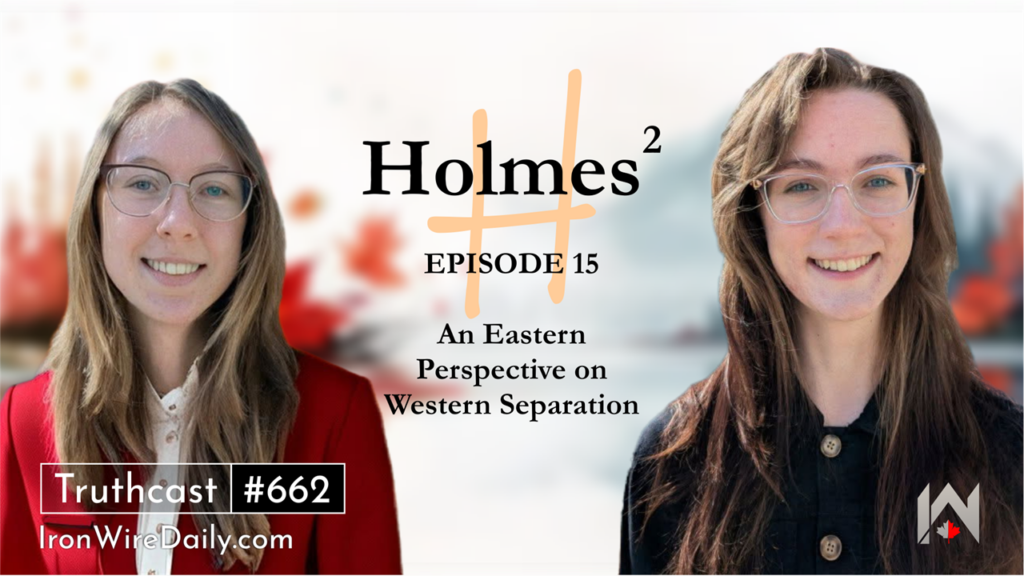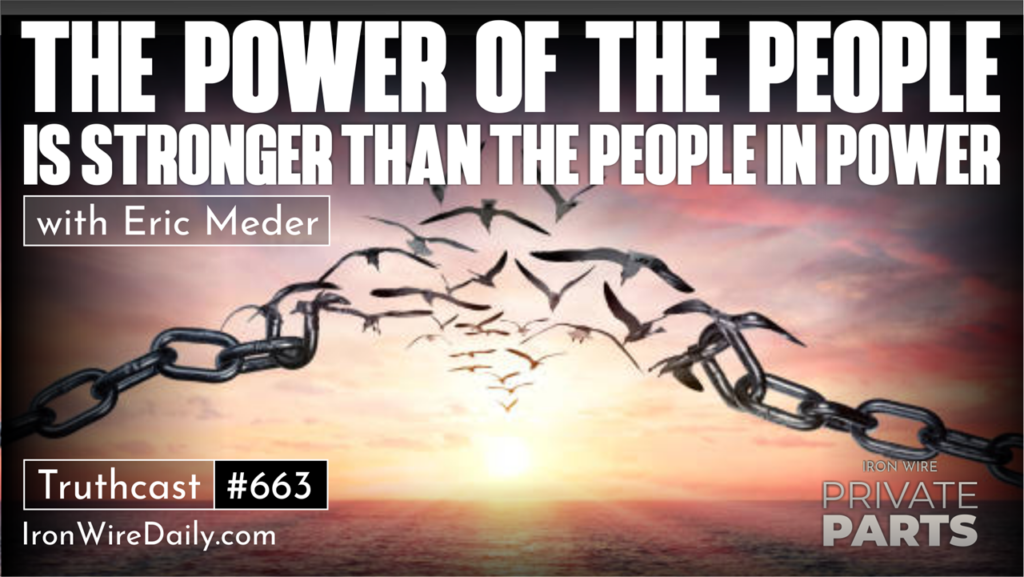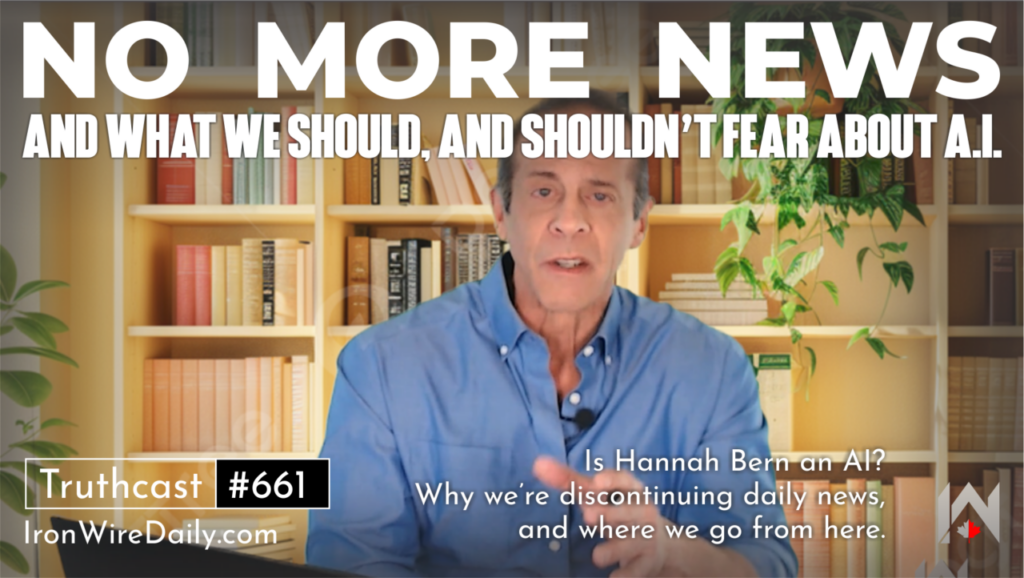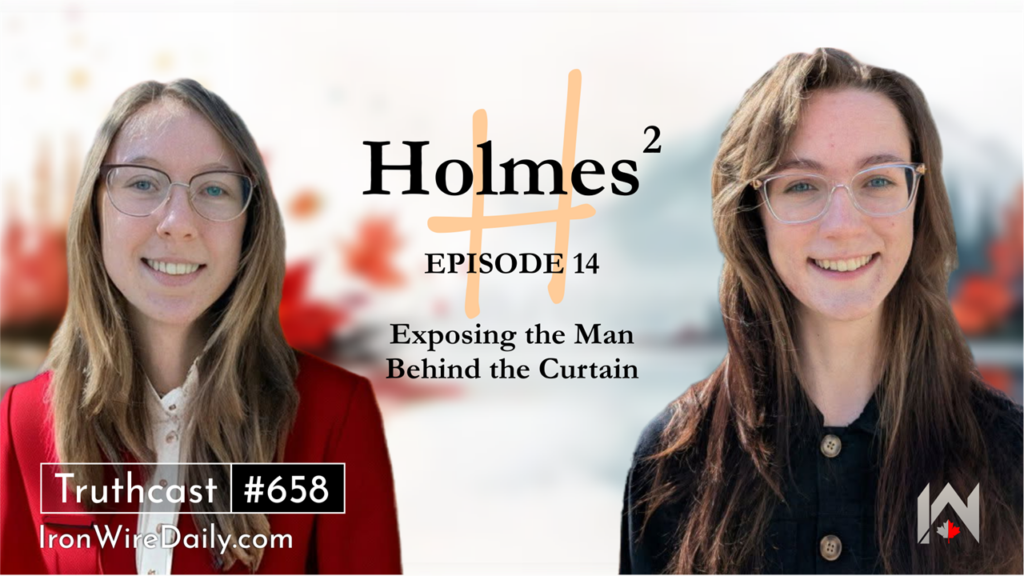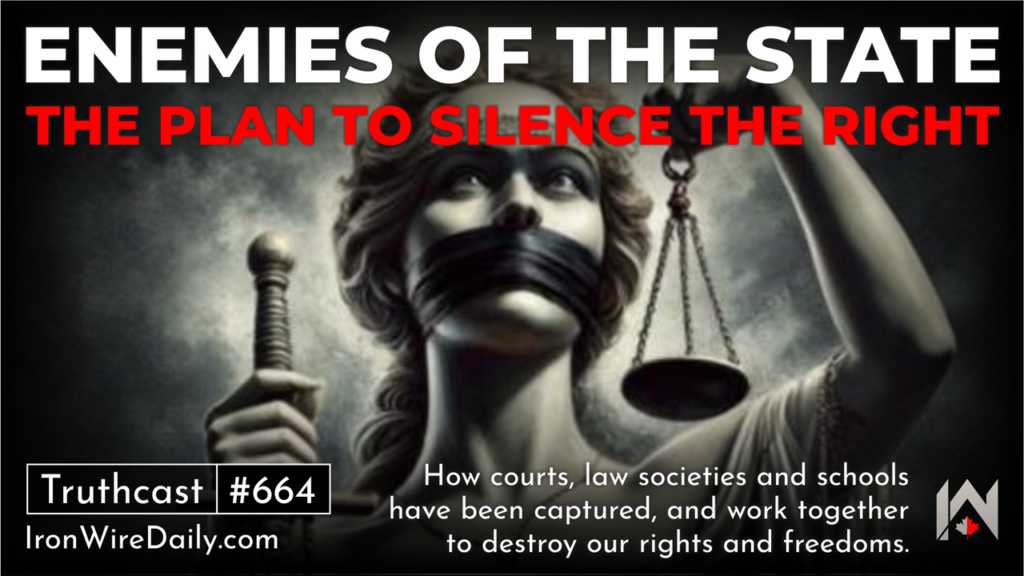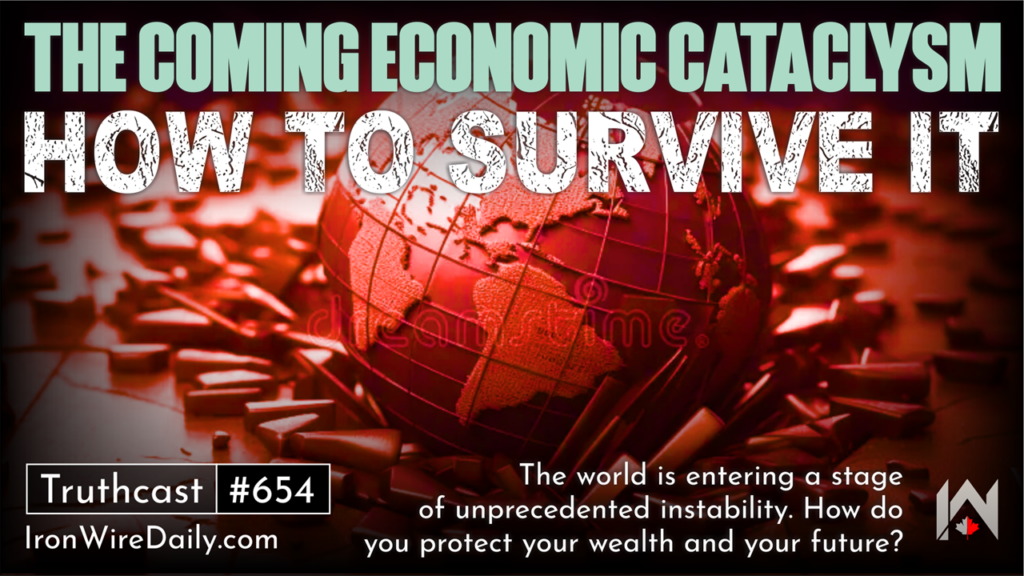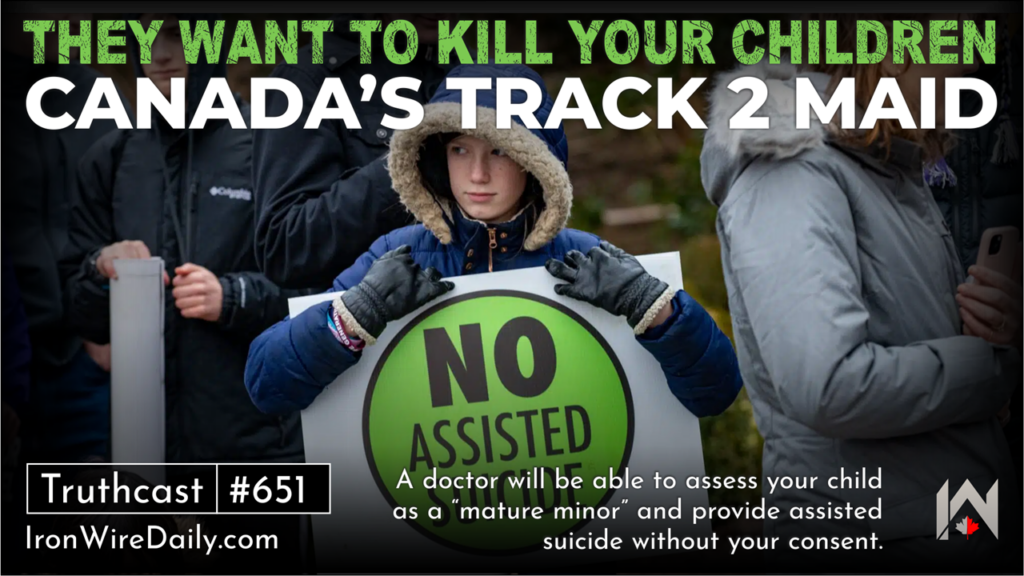Episode 3: “Feminism vs Womanhood”
Madison and Maycee Holmes
Want more Holmes?
Find them on Substack, Rumble and Youtube
Also you can contact the Holmes sisters directly at Connect@at-home-with-holmes.com
Get the Truth! Exclusive Interviews and News that mainstream media won’t report. https://ironwiredaily.com
Protect Your Assets from the Coming Economic Collapse. Buy precious metals at wholesale prices right here in Canada. https://info.newworldpm.com/154.html You can even transfer in your RSP. New World Precious Metals. You will also be supporting our efforts to bring Canadians the truth. We do receive a commission on purchases made through our affiliate link.
Get Sound Financial Advice. Adrian Spitters is a personal financial planner and author who successfully predicted both the dot-com crash and the crash of 2008, and also has access to many investment opportunities that other financial planners do not.
Adrian Spitters, Financial Consultant
Financial Advice for the Coming Economic Collapse
www.adrianspitters.com
adrian@adrianspitters.com
(604) 613-1693
Find and Join your LOCAL Freedom Community. We are building in-person freedom communities across Canada at https://freedomcoms.org. Joining is free and only takes a minute.
Get a truly Secure Phone. Above Phone! Purchase price includes a 45 minute online personalized orientation session. Stop the government and corporations from spying on you. https://abovephone.com/?above=101. Use code IRONWILL25 for $25.00 off any phone.
(0:00 - 0:06) Hi, I'm Madison Holmes. And I'm Maycee Holmes. And you're watching Holmes Squared. (0:08 - 0:37) Okay, so today we're going to talk about feminism, and that is partly because I recently was requested to do a presentation on the occult roots of feminism, which you can find on our Substack. This is an RTF presentation, Rising Tide Foundation, that is the platform of Matthew Ehret and Cynthia Chung. You will hear us allude to them almost every episode if... Literally read one of their articles last year. (0:37 - 1:37) Yeah, on the last segment, if you guys will remember. But so that's the first presentation I did on the occult roots of feminism. And then I was recently asked to do another one for another podcast called the Unslaved Podcast, which is, I believe, you can get a teaser, and then it might be behind a paywall. But at the very least, you can get a free version on the Rising Tide Foundation. But so to talk about feminism for me and Maycee is weird. It's weird for me, I know, and Maycee's nodding her head because she agrees. And I think the first thing we should talk about is why. Why is it weird for us to be talking about feminism? And I know, because we have a lot of friends who have looked at us and they call us the biggest women haters they know. Sometimes we call ourselves that just to go with the joke. (1:37 - 1:42) I definitely don't. That's on my neuroticis. Sorry, that was a projection. (1:44 - 4:18) No. But I'm not a woman hater. I mean, I don't hate myself. Maycee, do you hate yourself? Only sometimes. On occasion, right? So why is it weird for us to talk about feminism? And why do people consider us women haters? Are you asking me? I think that women that we've interacted with consider us women haters, because we're a little bit hard on them. But it's only because we're hard on ourselves. So that's why. It's not really anything against them. It's just we kind of take a bit of a different responsibility approach, if you will, to how we behave as women. Because a thing that we always say in our household is you should know what you are to better negotiate who you are. And when me and Maddie were younger, we were always kind of at least, at the very least, exposed to psychology and just human behavior patterns, just recognizing that. And when we were starting to recognize how women behaved, for better or worse, we got really, or at least I know I did, I got really, like hard on myself when I would see some of the characteristics of women that I didn't really like. And I would kind of go like, I don't want to be like that. Or I would like, I just don't want to do that. Or I even felt bad at sometimes for just having a period because it would make me mad during the month. And then I'd be like, well, that's not an excuse. Like I can't use that as an excuse to be a bad human being or to be mean and like moody for no reason. I didn't want to use that. But then there were also things where if it was a desire to have the attention from a male, I got hard on myself for it. I just didn't, I didn't want. I didn't want that. I was like, why do I want this? Like, I don't want to have that, I don't know, ruin whatever it was that my brain was thinking it would ruin. So those were some things that it wasn't necessarily that I wanted to be harsh on what naturally happens in the cycle of just being a woman. But it was more so I think for that, I just wanted to be a good human being. (4:18 - 5:28) So what are some of the things that you know, those things about being a woman? Like, what are those things, things that we first found out that we had to come to terms with? Women, it was something that dad said to me, actually, not too recently, where he said, you are going to have to be okay with the fact that you are going to deal with what women deal with. And so some of the things that I didn't, that I had to obviously come to terms with, is the fact that women's physique and our, our selling feature, if you want to call it that, I think we know a bit of what we, what we mean when we talk about that. Are you talking about women as like, objects, you know, the objectifying women type thing? Yeah, like, that is something that is part true, in the sense that it can happen, because every human being has a left hemisphere, so we can get utilitarian in our thinking. (5:29 - 5:54) Right. So you will have to face that as a woman. Right. That doesn't- Seen as a prize or something to be captured, won. And I didn't want to resent men for it. Like, I didn't want to do that. Because I know that I didn't choose to be a woman, so it's not really my fault. But I didn't want to be like, well, and then it's their fault, because they didn't choose to be men. Yeah, right. (5:54 - 7:23) So they have, they have something where they will feel an attraction to the way that we look versus we would have more of an attraction to the way that they behave. Right. But we still have our own standards, too. It's like we would, I would probably prefer someone who takes care of their body versus someone who doesn't. Right. So, like, we still hold standards. And sometimes, actually, the worst people to push us towards feeling like we're objectified is other women. Like, on social media, all the time, you'll see the influencers and then going, like, in their bikinis and all that and selling themselves. And don't get me wrong, like, if you want to, I guess, own your stuff, then good for you. But at the same time, women that put on the makeup and try to make themselves look a certain way, because they're thinking that that's what men like, or they're doing it, and they're selling it to themselves of like, oh, I'm just doing it because it makes me feel good. Or I'm just doing it because like, I really I'm an artist. And I like art. So I like to do my makeup like that. It's like, okay, when they do that, that also for girls that might be impressionable looking at that, makes them feel like, oh, is that what a woman's supposed to be? Are we supposed to look like that? Right. So I feel like a lot of it came from just trying to figure out what kind of a standard I wanted to set as a woman knowing I was going to probably be imitated by other people. (7:23 - 9:36) Yeah, no, that's really that's solid. Because even as I as an artist, the first time I heard another girl, and it was a girl, it wasn't a woman at the time, even I only, I'm 22, I started calling myself a woman maybe last year, maybe, if I was like, actually owning the term. But I was offended when they said, you know, I'm, I'm an artist, and I just like doing art on my face. I've done art, I know what it feels like. And I've put on makeup. When I was younger. I know the difference in the literal frequency in my soul, when I'm do putting paint on a canvas, versus putting makeup on my face. The makeup on my face was, there was an insecurity there. And I was trying to, I was trying to make something happen. Versus when I am doing art. I don't have the final destination in mind. It's not a utilitarian thing. You know, I'm trying to, I'm trying to discover something when I'm painting. Versus when putting on the makeup, there is there's a utilitarian goal. I know why I'm doing it. I know, maybe not how, because girls get to play with it. But it's, it's like, I guess that's also the question of the identity thing. And you said that already, you said you were trying to figure out what to demonstrate as a woman. And that's another thing. Because when we first started the psychology, and lurking and learning about our biology as women, what are the what are the facts about being a woman, you know, having the having the the menstrual cycle being hormonal, we have to deal with that on a monthly basis. Well, sometimes that makes us sad for no apparent reason, or angry for no apparent reason. We're physically weaker than men. I mean, sure, we can have there are studies about we have similar endurance, we can have similar endurance, though we physically don't have the same amount of hemoglobin. So we're the amount of power that a man can get. (9:36 - 11:57) We can't for the most part, especially not in the upper body on our lower body, we might be able to compete. But these are those are things where, you know, you and I work out to be strong for the family. And you know, if mom can't lift a box, we want to be prepared to do it. And for the longest time, I was upset with the fact that I was physically weaker than a man. And the the emotionalism of it. But then even things like, in Gad Saad's work, he talked about not only the science behind makeup, but even heels. The 34 degrees is how much it raises all of the girls' butts. That's literally something I learned. And then why women like long hair and certain things like that. And learning those things about myself, because he's describing biology. I have biology, he's describing what I'm going through when I was 15, 16, when I read the book. So that was the height of when I was going through it. And I know that I've, when I've talked about this, some women say, you know, I stopped wearing makeup after I learned stuff like that. Because like you said, I, something in me said, because you when you learn about your biology, you also learn about the mother instinct, because you learn about your neuroticism. You know why? Sometimes it gets conflated with empathy, because all the time, there's a stereotype about women being more empathetic. And it's partly true. But sometimes that empathy can get confused for neuroticism. And I think that's mode of attention, which you were bringing up with the hemispheres, left versus right. If a woman is being, she gets, maybe can start as empathetic, like a concern, a worry for a child that are going to hit their head on something. But then the left hemisphere can take it, lock on it. And then you get things like OCD, paranoia. And that's the same with being weaker. You were talking about how women can get that same fear, because we're weaker, we got to use our minds more, because we can't rely on our physical bodies to stay safe. We know if we walk past an alleyway, we're going to be wary if we're at night, in the dark, and if we're alone, because we wouldn't be able to handle handle ourselves if we got attacked compared to a man. (11:58 - 12:25) And knowing things like that, then you think about the neuroticism that you get as a woman. And you can't really think about being and demonstrating yourself as a woman without considering what it would be like to be a mother. Is that just me? Because when I started to think about what it meant to be a woman, I couldn't separate it from motherhood. (12:25 - 14:27) I couldn't. Is that just you? Or sorry, is that just me? I think that it's something that is a good consideration, because in the modern feminist movement, they kind of try and take away the value of motherhood. And maybe that's, maybe you kind of uncovered a reason as to why. Because when you, I have no problem with women wanting to climb the corporate ladder. I have no problem with women wanting the equal opportunity part. I mean, I obviously know, and I'm sure women do too, that some things are going to take more work than others. If you want a really labor-extensive job, then it's like, you're going to just have to work hard, honey. And it's no different than even men, though, that are maybe who are doing jobs that are a bit more social extensive. It's like, they have to be good with people, right? And a lot of people that you're going to deal with, I don't know if this is, I'm pretty sure this is a psychological fact. It just feels intuitively correct that when you are dealing with women versus men in a room, it's like men and women alike, I think, would probably just trust the feeling like either protected or safe around women, right? Because some dudes will have that measuring to each other where they feel like, I wonder if I could fight him, right? They don't wonder that with women. So they're like, there's nothing, there's not that underlying insecurity of even a man towards a woman in that way. That's just not, that's not there, I don't think. I can't, I don't know, I'm not a man, but like, I don't think it's there. There's an insecurity in the sense of, you know, could I get her? That's true. So the fear might come from the fact of like- Rejection. (14:27 - 15:47) Rejection, right? But depending, there still might be like a, sure, so that's just a fear of she's just like, can I approach her for that reason? But maybe if it was in the sense of like, looking more at her as of not like a mother, but like a, she's a woman, so she has some care and empathy, maybe, hopefully you would hope, in her, then she's a little less scary, right? And other women definitely, we vote each other down in social settings sometimes because we're competitive that way. Whereas sometimes men would actually vote each other up, right? But women do have though, that sense of feeling safe around other women, if you had to compare to like men, because of the fact that we are women. So, and so we understand each other. So maybe it's the same with men too. Maybe they feel that way as well. We do go to the bathroom together. That's something all men find it weird, but women, we move in packs. But so when we were talking about the idea of the motherhood thing and the fact that they're taking that away in this feminism movement, again, no problem with you wanting to climb the corporate ladder. But the problem that I will face sometimes is the fact that women will be like, oh, I feel oppressed by the fact that I have to be the domestic wife. (15:47 - 17:27) I feel like that's like, then they start saying, well, that's a stereotype and I don't have to adhere to that and blah, blah, blah. And I'm like, you're not even taking in the context of your entire being. Sorry, honey. You're not taking into the context of your entire chemistry and biology to even understand that you do one of the most amazing jobs that any person could do on this planet, which is raise the next generation. Oh my God. You said responsibility at the beginning. You said perhaps the reason, you know, we're so hard on women, AKA ourselves, is because we took a different responsibility to it. And I think that's the key thing and why I even brought up a motherhood is because as we were learning more about our biology, that realization about we are literally our jobs, biologically speaking, is to raise the next generation. There is nothing more that says you're going to be mirrored than that. So knowing that we literally set an example for the next, not just our kids, but other current girls too. And women, I mean, women are trying to look up to other women all the time. I mean, that's one of the things you and I really have a hard time with, with other girls our age is that they look at Taylor Swift, they look at Lady Gaga, they look at Miley Cyrus, they look at Ariana Grande, and they think that these are genuine, strong, even Emma Watson. And I, I love Harry Potter. I'm just going to say that now. And Hermione Granger is portrayed in the movies is great. (17:28 - 18:19) But even Emma Watson, she did, I believe a couple of speeches on feminists, being a feminist, womanhood. And I didn't resonate. There was something, there was something about it that still didn't hit the right frequency in it with me. And that's, that's one thing that. Just to add to that, I think it just reminds me of some of a line where it's like, you can get left hemispheric about your right hemisphere. And for those who don't really understand, it's like, I'll play it in the context of what we're talking about. You can get prideful and boastful and locked on being an empathetic person or being a mother. Like we, the edible mother or devouring mother syndrome is something that, where that problem can manifest. Oh, so safety culture. (18:19 - 23:44) Like safety culture. Yeah. But also like, you'll get locked on the fact that you can be a soothing character. And there's something about that where when, sometimes when like men talk about that, where that's what they're attracted to, where they like the fact that the woman who has a caring, caringness to her, women instantly will think about that and go like, like they might get mad. Like, and so I, some feminists might be like, don't reduce me to just somebody who, a birthing person, a birthing person and empathetic. And I'm not a mom and I'm a bad bitch. But, but some women, if you have your head on straight, I feel would probably resonate to some aspect of that where it's just like, Hmm, like I do want to make sure that I am a caring individual. I feel like, like I said, like it was something that you talked about, Maddie, when we were doing our episode on Audi with Laura about women, you said, and even in your cult feminism presentation, you said that how I figured out how to be a good woman was just how I figure out to be a good human being. And you said a lot of that also came from dad. Yeah, I was about to say, that's one of the, that's one of the most, I don't know if it's embarrassing because, you know, men and women are supposed to complement one another. And that's, that's the one thing you and I are definitely learning more as we go because initially it started with how to be a good woman, but it's almost virtually impossible to talk about feminism or womanhood without talking about men and the relationship to them. So this, it shouldn't be as embarrassing as a statement or as contradictory or as insulting as some women have found it. But to be a decent woman, I had to learn when to man up. And I know that that shouldn't sound offensive or contradictory. I looked at my dad and went, you know, there are some of the things about being a woman that are so inconsistent and that, that's true. Women can be very inconsistent on a consistent basis. We literally have our menstrual cycles that can throw us out of whack and we have to keep all of this in mind. We're more sensitive to even things that go on in the atmosphere because of that. I looked at my dad, who doesn't have the same up and downs, hormonally speaking that I do, and went, how can I mimic that to the best of my ability so I can be a reliable figure, a reliable idol? Because that's the thing. And as women, it was hard to find a decent woman figure for me personally, because that's the thing we were saying at the beginning, you know, people call us women hater and women are more likely to vote other women down. So you and I even have to keep that in mind because we don't want to look at another woman and then not find positive things about her. Because we did use mostly men to try and balance out the negatives to our positives. I think we learned, we are learning as we get older, the positives of being women and where we should compliment other women for what they do. But to start anyway, I didn't have any figures to look up to. Now, you and I, and that's the woman archetype, you and I have started literally building a list. One of the first ones that I can remember is, I know it's still Hollywood because it's from a movie, but Mae Brodock from Cinderella Man. Because she still had the neuroticism that women do. She had the fear of losing her husband from the fight and she had the fear for her children starving because they were in the depression. She couldn't get rid of her neuroticism and you can't, you can't stop your biology. But she was honest about it and she communicated with her husband and then when he went, no, no, as a man I put my word even though you're afraid and I totally recognize that, we can't act upon your fear. You have to take the risk with me. And she did despite herself and that was really admirable. Yeah, like dad talked about that too. He was telling us, like his, him and mom were obviously our parents, right? So when they saw how me and you and Sebastian were play fighting with dad, right? Mom would be the one that was like, okay, be careful. Like don't, don't hurt anybody, right? And most women would probably play that role. And then, but there were some moments where as a woman and what you're speaking to, you have to kind of let go of the fear to let the potential of what getting hurt, but not even just getting hurt, but the potential of just in exchanging, even though there could be risk of getting hurt, right? So that is that idea of the, so you can't coddle all the time. And I think Consequences. Yeah. Because that's not the real world. And that was, so sometimes the thing that we found admirable when we were starting to see that with women is in the film that Maddie's referring to, uh, both women were sitting at the table talking about their men and how they didn't want them to go into the fight. And we're talking about boxing, but she was just like, can you ever stop yours? Right. But that was her choice actually saying, I'm not going to go and try and stop him. (23:45 - 27:03) Not because of the fact that it's like, she knew kind of like that she couldn't because of him choosing to be his, his own admirable man, like his own admirable self. He chose to say, no, I'm going to honor my word. This is for my family, for my bigger picture. So he knew he probably wasn't going to get stopped, but she was like, I'm not going to try to like, I'm not gonna, I might protest a little. I might tell you I'm fearful. But then also, um, near the film when he said, please, like, would you come to support me? She was like, no, I can't. Right. It's like, I don't want to see you get hurt. But then afterwards he said, well, how are you going to win without your biggest fan? Right. So it's just, there was something about that where it was just like, that's that relationship and that coming together that was so beautiful. And I think that that is what you and I, as we get older and we progress as young women, we keep in mind the fact that it's like, we are meant to be a compliment to something bigger to other women, to men, to our future children if we so choose to have them. Um, and I think that that's what it is that, um, kind of taught us to, um, keep that in mind is the fact that it's like, there's something else bigger than just you. Right. And I think the thing of the feminism movement is sometimes it gets too focused on you, honey. Like you're just getting too self-centered in your thinking because it's like, there's something quite beautiful about the fact that now you're thinking about something beyond yourself. Well, yeah, like I said at the beginning, when you start learning about what you are as a woman, um, in your biology and stuff, instinctively, you also, you realize how much is literally ingrained in you to consider other people, because if you're going to be a mother, which is in our biology, you have to consider your kid. So we have, we have conscientiousness ingrained in us and that, that can go too far as we can, that can get manipulated and of which it has, but it is something that's, we can understand that's beautiful, but our disposition is our natural ability to consider other people. Um, you know, they talk about the 150 people we can manage and women will, we're the networkers, you know, we can, men can do it too. It's just women, it comes more naturally on average. Um, and you brought in the feminism movement. And I guess that's one thing that now that we've kind of opened up this whole thing, there's a difference between feminism and womanhood. Now that we've had this whole conversation, we've talked, we haven't really talked about feminism. We've talked about womanhood. And so are we women haters? I hope people now know, no, we're not women haters. Um, part of like, like you said, there's just certain things we identify as we've talked about. If we're talking about womanhood, we identify with womanhood, but we don't identify with, and you can correct me if I'm wrong, but we don't identify with feminism. I don't anyway. I think the problem is, is that if you really think about the concept of feminism, the whole thing that they keep on pushing is the fact that we want to be independent and we want to be able to handle our own. Right. But it's like, you convinced yourself that you're a victim. (27:04 - 27:10) You did that. That's your fault. You looked and you were like, women got oppressed in the past. (27:10 - 28:19) So we are oppressed now. And I'm an objectified thing. And now I need to defend myself at all costs because I'm a victim. Right. It's like, hold on it. Whatever happened to the individual autonomy? Who the hell said that you had to be the victim? It's like, you can take on that responsibility of your life. You know, you don't have to believe that you're just this objectified thing to make yourself feel like you need to defend yourself. It's like, you can find more value in you than just your fears of what it is that you're afraid of being objectified as. Yeah. The value is, is a good thing. Finding value in different things. Cause with feminism, one of the things you and I don't identify with regarding the feminism movement is, since the origins of it, and again, if people want to know some of the deeper, more sinister origins of the feminism movement, even the financiers who backed it, those are things you should be looking into. You can go to my presentations of which I go over its history, its origins, some of it anyway. She does a really good job. She's being modest. (28:19 - 30:19) But with the feminism thing is that they look at women and you, you alluded to this, women, their power being in their sexuality. But just cause you and I know that we're physically weaker than most men that didn't, that demoralized me in the beginning, but not anymore because I know that I can do, I can still become hell of a lot stronger. Even if it's in comparison to certain things, I understand my job and my value. Now, my value as a woman isn't to be the strongest person in the room where I could one punch anybody. My value I've found more in, you know, building my brain and then still keeping my body healthy because I have to help other people. And if I want to have kids, I got to encourage healthy, healthy habits for other girls that are doing this thing. But the value in the feminism movement is all around sexuality. And the, your whole identity now is your gender. And that's the way, that's the funniest thing, this whole thing about my gender shouldn't define me. Well, that's the feminism movement. You're you being your woman thing. And with us in our brain work with Iain McGilchrist, um, the first time I did the presentation, dad helped me with this funny enough left hemisphere formula. What you should be considering as an individual, the one, and at the top of the hierarchy, your hemisphere proclivity to your gender through your age, but see how gender second, it's not the first thing you should be considering. You consider it second, because we do have a physical biological reality to what we are. But the first one is the hemisphere proclivities, because that's where all of the nuances about how men and women think that really comes into play. And then you have to figure out what kind of woman do I want to be if I have right hemisphere proclivity versus left. And that's something that we'll talk about more in our future segments, because there's a lot there. That's a big question. (30:20 - 30:32) Yeah. And I know our time is basically up, but I I'll take like maybe one more minute before we close off. But I think it's also just don't let your fear get manipulated for something ugly. (30:32 - 33:43) Because I know that like a large reason why women might get resentful towards men when it comes to the feminism movement is because of the fact that they don't want to be manipulated physically. Because they like you, they were kind of upset about the fact that that's something that can happen, like maybe a rape or just someone stalking you, and you don't know what's going to happen with that. And just having your space invaded, basically. But that paranoia can turn to that point where now you're getting, you're projecting that onto every man that you interact with. And that's not good. And then the same thing with men, the same thing can happen with men. It's like they can take a look at all women if they wanted to because of their fear of not attracting one. And then they start to get resentful about us thinking that we are there purposefully to spite them. But that that's, it's shallow thinking on both ends. Hence why both can be a victim of their own left hemisphere. So I think that is a good way to end off where it's like what Maddie was just talking about. You really gotta, like when we're saying hemisphere, victim of your own hemisphere, that's the stuff that we think is the most important for people to get their heads wrapped around is how can your left hemisphere, which deals primarily of the emotion of fear of uncertainty. Fear, anger, yeah. Fear and anger, how can that get manipulated for us to turn against each other instead of actually learning how to cooperate and be a complement to the limited, limitless of how you are as a woman or how you are as a man. Because there is individual distinctions and you can't, and if you want to fight that all you want to, you're literally just shooting yourself in the foot. It's like you gotta, if anything, stop generalizing so much to the point where you're getting upset that you're not, that we're not all the same and actually learn the individual uniqueness of what makes you you as opposed to men but for all the reasons as to why you can be more helpful as a person to anyone. Right, right. That being 33 minutes, we're three minutes over. I'm sorry, everybody. I want to say thank you again, Will, for giving us the segment and the name. Thank you for people sending us emails. If you guys enjoy this, send us another email. It's good feedback for us and if there's any future topics that you guys are particularly curious about or you want the young perspective, whatever that means, send us an email. Send it our way. We're always, there's endless topics to talk about but we love input and feedback so thank you everybody for watching. Maycee, do you have anything else to add? No, just thank you. Okay, now we gotta do the, we gotta do the thing. This has been, ready, ready? This has been Holmes Squared.
